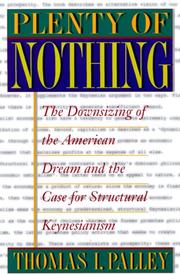| Listing 11 - 14 of 14 | << page >> |
Sort by
|

ISBN: 0691133328 Year: 2008 Publisher: Princeton, N.J. : Princeton University Press,
Abstract | Keywords | Export | Availability | Bookmark
 Loading...
Loading...Choose an application
- Reference Manager
- EndNote
- RefWorks (Direct export to RefWorks)
On May 11, 1857, Hindu and Muslim sepoys massacred British residents and native Christians in Delhi, setting off both the whirlwind of similar violence that engulfed Bengal in the following months and an answering wave of rhetorical violence in Britain, where the uprising against British rule in India was often portrayed as a clash of civilization and barbarity demanding merciless retribution. Although by twentieth-century standards the number of victims was small, the Victorian public saw "the Indian Mutiny" of 1857-59 as an epochal event. In this provocative book, Christopher Herbert seeks to discover why. He offers a view of this episode--and of Victorian imperialist culture more generally--sharply at odds with the standard formulations of postcolonial scholarship. Drawing on a wealth of largely overlooked and often mesmerizing nineteenth-century texts, including memoirs, histories, letters, works of journalism, and novels, War of No Pity shows that the startling ferocity of the conflict in India provoked a crisis of national conscience and a series of searing if often painfully ambivalent condemnations of British actions in India both prior to and during the war. Bringing to light the dissident, disillusioned, antipatriotic strain of Victorian "mutiny writing," Herbert locates in it key forerunners of modern-day antiwar literature and the modern critique of racism.
Polemics in literature. --- Literature and history --- Politics and literature --- English literature --- History --- History --- History and criticism. --- India. --- Great Britain. --- India --- India --- India --- India --- In literature. --- History --- Public opinion. --- History --- Historiography. --- History --- Literature and the rebellion. --- Abbot, Major. --- Achaia. --- Amalekites. --- American Civil War. --- Balaclava. --- Barrackpore. --- Bentham, Jeremy. --- Board of Control for India. --- Bosch, Hieronymus. --- Bush administration. --- Calvinism. --- Carnell, Jennifer. --- Chartism. --- Chuckerwallah Kothie. --- Coopland, Reverend. --- Danton, Georges Jacques. --- Dostoyevsky, Fyodor. --- Euphrates. --- Evangelicalism. --- Frazer's Magazine. --- Futtehgur. --- Great Exhibition. --- Heisenberg Uncertainty Principle. --- Highlanders. --- Ironsides. --- Islam. --- Jews. --- Kipling, Rudyard. --- Lahore Chronicle. --- Manchester Guardian. --- Mephistopheles. --- ancien rgime. --- anti-Victorianism. --- atavism. --- caste system. --- concentration camps. --- determinism. --- diabolism. --- disillusionment. --- escape narratives. --- executions. --- fanaticism. --- femininity. --- feudalism. --- gallows. --- genocide. --- globalization. --- imperialism. --- instinct. --- jingoism. --- mutilation.
Book
ISBN: 1282772406 9786612772405 0520942175 9780520942172 9780520257290 0520257294 9780520265813 0520265815 9781282772403 6612772409 Year: 2009 Publisher: Berkeley : University of California Press,
Abstract | Keywords | Export | Availability | Bookmark
 Loading...
Loading...Choose an application
- Reference Manager
- EndNote
- RefWorks (Direct export to RefWorks)
In the run-up to war in Iraq, the Bush administration assured the world that America's interest was in liberation-especially for women. The first book to examine how Iraqi women have fared since the invasion, What Kind of Liberation? reports from the heart of the war zone with dire news of scarce resources, growing unemployment, violence, and seclusion. Moreover, the book exposes the gap between rhetoric that placed women center stage and the present reality of their diminishing roles in the "new Iraq." Based on interviews with Iraqi women's rights activists, international policy makers, and NGO workers and illustrated with photographs taken by Iraqi women, What Kind of Liberation? speaks through an astonishing array of voices. Nadje Al-Ali and Nicola Pratt correct the widespread view that the country's violence, sectarianism, and systematic erosion of women's rights come from something inherent in Muslim, Middle Eastern, or Iraqi culture. They also demonstrate how in spite of competing political agendas, Iraqi women activists are resolutely pressing to be part of the political transition, reconstruction, and shaping of the new Iraq.
Iraq War, 2003-2011 --- Women --- Women's rights --- Anglo-American Invasion of Iraq, 2003-2011 --- Dawn, Operation New, 2010-2011 --- Gulf War II, 2003-2011 --- Iraqi Freedom, Operation, 2003-2010 --- New Dawn, Operation, 2010-2011 --- Operation Iraqi Freedom, 2003-2010 --- Operation New Dawn, 2010-2011 --- Operation Telic, 2003-2011 --- Persian Gulf War, 2003-2011 --- Telic, Operation, 2003-2011 --- War on Terrorism, 2001-2009 --- Human females --- Wimmin --- Woman --- Womon --- Womyn --- Females --- Human beings --- Femininity --- Rights of women --- Human rights --- Women. --- Political activity --- Social conditions. --- Civil rights --- Law and legislation --- Legal status, laws, etc. --- Women in politics --- Iraq War, 2003 --- -Human females --- -Iraq War, 2003-2011 --- 21st century american history. --- 21st century iraqi history. --- activism. --- bush administration. --- gender studies. --- government and governing. --- growing unemployment. --- human condition. --- international policy. --- iraq. --- iraqi women activists. --- iraqi women. --- islam. --- middle east. --- middle eastern politics. --- muslim. --- new iraq. --- ngo workers. --- political. --- president bush. --- president george w bush. --- scarce resources. --- seclusion. --- sectarianism. --- united states of america. --- violence. --- war and gender. --- war in iraq. --- war zone. --- warfare. --- womens rights activists. --- womens rights. --- Social conditions
Book
ISBN: 128277249X 9786612772498 0520943120 9780520943124 9780520254725 0520254724 6612772492 Year: 2009 Publisher: Berkeley : University of California Press,
Abstract | Keywords | Export | Availability | Bookmark
 Loading...
Loading...Choose an application
- Reference Manager
- EndNote
- RefWorks (Direct export to RefWorks)
Jose Padilla short-shackled and wearing blackened goggles and earmuffs to block out all light and sound on his way to the dentist. Fifteen-year-old Omar Khadr crying out to an American soldier, "Kill me!" Hunger strikers at Guantánamo being restrained and force-fed through tubes up their nostrils. John Walker Lindh lying naked and blindfolded in a metal container, bound by his hands and feet, in the freezing Afghan winter night. This is the story of the Bush administration's response to the attacks of September 11, 2001-and of how we have been led down a path of executive abuses, human tragedies, abandonment of the Constitution, and the erosion of due process and liberty. In this vitally important book, Peter Jan Honigsberg chronicles the black hole of the American judicial system from 2001 to the present, providing an incisive analysis of exactly what we have lost over the past seven years and where we are now headed.
Prisoners of war --- Detention of persons --- Human rights --- War on Terrorism, 2001-2009. --- Combatants and noncombatants (International law) --- Noncombatants (International law) --- Armed Forces --- Belligerency --- Military law --- International law --- Exchange of prisoners of war --- POWs (Prisoners of war) --- War prisoners --- Prisoners --- Global Struggle Against Violent Extremism, 2001-2009 --- Global War on Terror, 2001-2009 --- GWOT, 2001-2009 (War on Terrorism) --- Terror War, 2001-2009 --- Terrorism War, 2001-2009 --- War against Terrorism, 2001-2009 --- War on Terror, 2001-2009 --- Military history, Modern --- Terrorism --- World politics --- Afghan War, 2001 --- -Iraq War, 2003-2011 --- Operation Enduring Freedom, 2001 --- -Legal status, laws, etc. --- Government policy --- Legal status, laws, etc. --- Prevention --- Guantanamo Bay Detention Camp. --- Guantánamo (Detention camp : Guantánamo Bay Naval Base) --- Gitmo (Detention camp : Guantánamo Bay Naval Base) --- Guantánamo Bay Naval Base (Cuba). --- Camp Delta (Guantánamo Bay Naval Base) --- Afghan War, 2001-2021 --- Iraq War, 2003-2011 --- United States --- War on Terrorism, 2001-2009 --- Prisoners and prisons --- Cuba --- Guantánamo Bay Detention Camp --- Cases --- Prisoners of war - Legal status, laws, etc - Cuba - Guantanamo Bay Naval Base. --- 2001. --- 21st century. --- afghanistan. --- america. --- american judicial system. --- american policy. --- american soldiers. --- bush administration. --- criminal investigation. --- dark. --- discussion books. --- engaging. --- foreign policy. --- guantanamo. --- human rights abuses. --- hunger strikers. --- imprisonment. --- injustices. --- intense. --- litigation. --- men at war. --- national security. --- nonfiction. --- political. --- september 11. --- terrorism. --- terrorist imprisonment. --- tragedies. --- trial. --- us constitution. --- war on terror. --- warfare.

ISBN: 0691050317 0691227608 Year: 2000 Publisher: Princeton, N.J. : Princeton University Press,
Abstract | Keywords | Export | Availability | Bookmark
 Loading...
Loading...Choose an application
- Reference Manager
- EndNote
- RefWorks (Direct export to RefWorks)
Business papers today are in a triumphant mood, buoyed by a conviction that the economic stagnation of the last quarter century has vanished in favor of a new age of robust growth. But if we are doing so well, many ask, why does it feel like we are working harder for less? Why, despite economic growth, does inequality between rich and poor keep rising? In this wide-ranging and provocative book, Thomas Palley pulls together many threads of "new liberal" economic thought to offer detailed answers to these pressing questions. And he proposes a new economic model--structural Keynesianism--that he argues would return America to sustainable, fairly shared prosperity. The key, he writes, is to abandon the myth of a natural competitive economy, which has justified unleashing capital and attacking unions. This has resulted in an economy dominated by business. Palley's book, which began as a cover article for The Atlantic Monthly in 1996, challenges the economic orthodoxies of the political right and center, popularized by such economists as Milton Friedman and Paul Krugman. He marshals a powerful array of economic facts and arguments to show that the interests of working families have gradually been sacrificed to those of corporations. Expanding on traditional Keynesian economics, he argues that, although capitalism is the most productive system ever devised, it also tends to generate deep economic inequalities and encourage the pursuit of profit at the expense of all else. He challenges fatalists who say we can do nothing about this--that economic insecurity and stagnant wages are the inevitable results of irresistible globalization. Palley argues that capitalism comes in a range of forms and that government can and should shape it from a "mean street" system into a "main street" system through monetary, fiscal, trade, and regulatory policies that promote widespread prosperity. Plenty of Nothing offers a compelling alternative to conventional economic wisdom. The book is clearly and powerfully written and will provoke debate among economists and the general public about the most stubborn problems in the American economy.
Keynesian economics. --- United States --- Economic policy --- Economic conditions --- Anderson, A. --- Aschauer, D. A. --- Bensinger, Richard. --- Bronfenbrenner, Kate. --- Bush administration: fiscal policy. --- Cold War. --- Corrigan, E. Gerald. --- Eisner, Robert. --- Eurodollar market. --- Federal Reserve Reform Act (1977). --- Fisher, Irving. --- Friedman, Milton. --- Friedman, Rose. --- Galbraith, John Kenneth. --- Gordon, D. M. --- Greenspan, Alan. --- Heilbroner, Robert. --- Howell, D.R. --- International Monetary Fund (IMF). --- Keynes, John Maynard. --- Mexican peso crisis (1995). --- Minsky, Hyman. --- Palley, Thomas I. --- Phelps, Edmund. --- Schor, Juliet. --- balance-of-power hypothesis. --- bankruptcy. --- bureaucratic-failure theory. --- capacity utilization: levels (1948-95). --- capitalism: Cold War victory of utopian. --- chief executive officer (CEO) pay. --- communism. --- comparative advantage. --- competition: for jobs. --- consumption-binge hypothesis. --- debt, household. --- demand: effect of deficient. --- deregulation: effect of. --- economic performance: of median family. --- economic theory: antilabor. --- employment cost index (ECI). --- exploitation. --- fatalism, economic. --- individualism, laissez-faire. --- insecurity, worker. --- investment diversion. --- job loss rates. --- labor standards, core. --- law of one price. --- lower class increase (1973-90). --- monetarists. --- oil shocks, post-1973 effect. --- product market competition. --- recession: 1990.
| Listing 11 - 14 of 14 | << page >> |
Sort by
|

 Search
Search Feedback
Feedback About
About Help
Help News
News